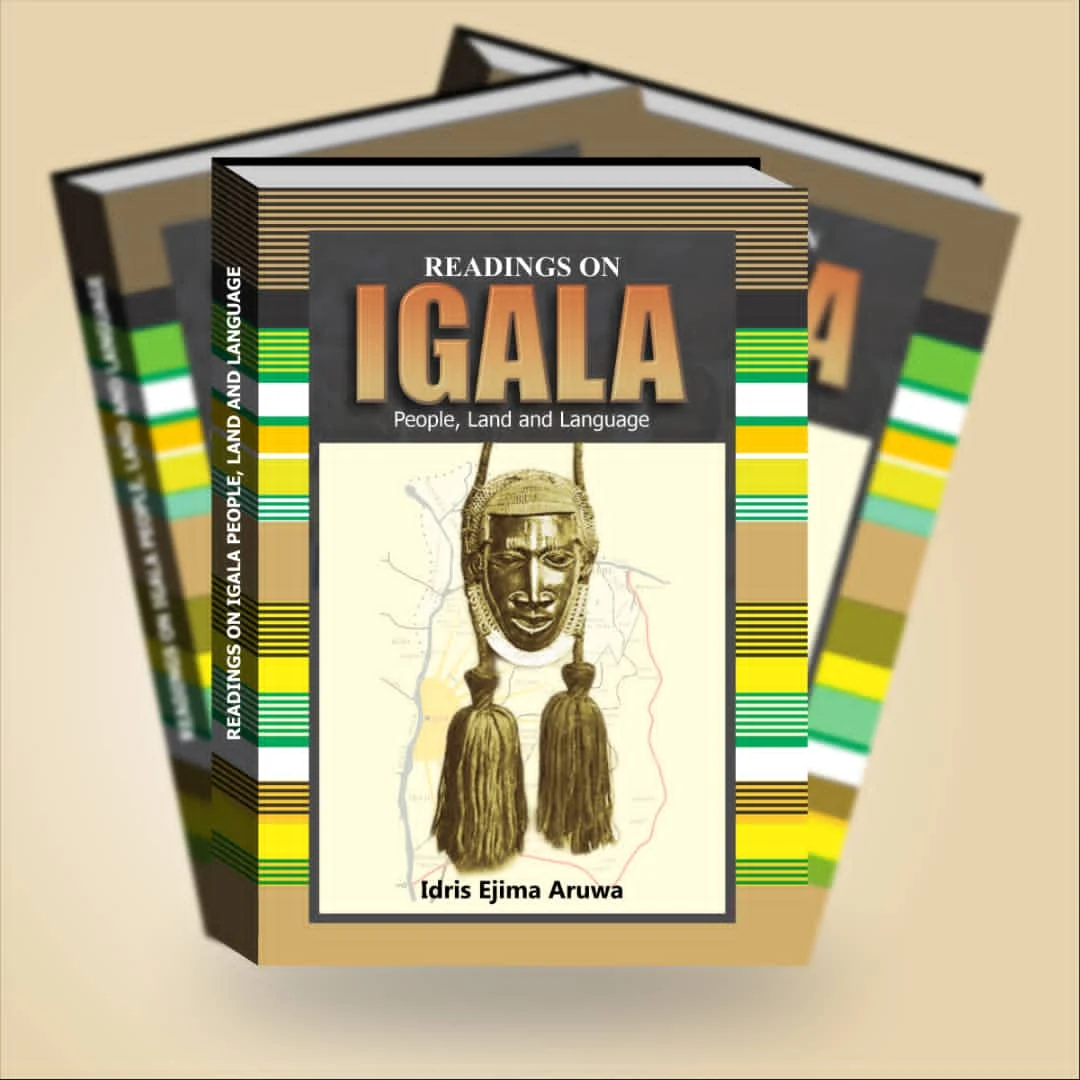Prompting you the best.....
READINGS ON IGALA PEOPLE, LAND AND LANGUAGE By Idris Ejima Aruwa || Aruwaab9ja
The book Readings on Igala People, Land and Language, from the Author’s commentary, “is a comprehensive history of the Igala kingdom (Kogi state, Nigeria), people, land and language based on the study of the oral traditions, cultural practices, articles, published and unpublished works on Igala history. It is a compendium of the history of the Igala people from the Pre-16th century to the present day, using the Igala cultural and rituals practices as evidence of historical events. It is a scholarly work on the chronology of the events that led to the establishment of the present dynastic monarchy in Igala land and the creation of the Igala kingdom which became the greatest pre-colonial kingdom in the River Niger-Benue confluence area in Nigeria, with its influence on the cultural, political and commercial developments on the northern Igbo country and along the River Niger down to the Niger-Delta area. The chronology was discussed under three main eras; the Pre-Dynastic Monarchy Era, the Proto-Dynastic Monarchy Era and The Dynastic Monarchy Era. The events that took place in each of these eras were extensively reported. The book illustrates the cultural leadership development of the autochthonous Igala clans, the Benin vassal Aji-Ata dynasty, the Achadu clan and the Empire building escapades of Ayegba oma Idoko starting from his progenitor “Abutu-Ejeh” breakaway from the ancient Jukun led Kwararafa Kingdom. Other subjects discussed include; the real history behind the sacrifice of Princess Inikpi and Oma-Odoko, the funeral rites and coronation rituals for the Ata-Igala and the origin of the name “Igala”. This book is recommended for students of history and those who want to enrich their knowledge on Igala, people, land, language and other related cultural matters”.
The book, made up of Fifteen Chapters, “is a compendium of the oral traditions, cultural practices, rituals and traditional festivals of the Igala people, a result of over 20 years of historical research and the enthusiasm of the author, and its focused on the chronology of Igala history by identifying the three major eras in the development of the cultural and political system of the kingdom. It is a must read for Academics, Historians, Students and everyone with interest in pre-colonial Kingdoms that made up the present day Nigeria.
A cursory overview of the Chapters by the Author reveals that; Chapter 1 introduces “the title of the book by defining the term “Igala” as a reference to the ethnic group and the language spoken by the people. It is also used to refer to the land in which the people live as “Ane-Igala” -meaning Igala land. It discusses the dynamics of the size of Igala kingdom pre-colonial, colonial and post-colonial (British) rule in Nigeria. The chapter concluded by stating the three main eras in the history of the Igala kingdom”.
Chapter 2 discusses “the challenges encountered by most writers of the Igala history and their different postulations on the origin of the Igala people based on information collected from oral traditions. Most early explorers and researchers of Igala history find it easier to tell the history of Igala Kingship, avoiding the complexity associated with the history of the different components that makes up the Igala people. The true identity of the people referred to as Akpoto or Okpoto was also presented”.
Chapter 3, 4, 5 & 6 covers the “Cultural developments and administrative structures of the Igala Chiefdom within Idah and its environs in the years before 16th Century. During this era, the Igalamela clan chiefs were in total control of the leadership institution in a confederacy-style government where the head of the Igalamela confederacy had limited powers, and decisions on all important issues are taken in consensus as against the total power attributed to a monarchial system of governance. Each Igalamela chief exercised direct control over its clan and only issues such as dispute resolutions, joint hunting expeditions, farmlands and settlement allocation, security and wars are discussed at the Igalamela confederacy council”.
“The members of the Igalamela clans suffer amnesia of their origin and movement to their present location in Idah. The history of the Nine Igalamela clans and their genealogy is reported based on the collection of oral traditions from the period of the emergence of Ayegba oma Idoko and their role in the establishment of the Igala kingdom. The roles of the Igalamela chiefs had undergone different transformations from the pre-dynastic monarchic era through the proto-dynastic and the dynastic monarchy eras up till this modern day, their roles had been subjected to the whims and caprices of the political powers that be at any point in time, both political and traditional. However, their status as the kingmakers remained unchanged”.
Chapter 7 & 8 discusses “the proto- dynastic monarchy era (c. early 16th to late 17th century). The events in this era were illustrated in the Certified True Copy of “The Chronicle Sketched Map of the Ata’te of Igala” collected from the National Archive. These events changed the entire traditional politics, cultural practices and identity of the people that became known as Igala. The foundation of the political developments that led to the establishment of Igala Kingdom began in this era. The era started with the Idah-Benin war, the overthrow of the Igalamela clans led Confederacy by the Benin vassal Aji-Ata dynasty in Idah, the emergence of the Kwararafa break-away royalist led by Abutu-Ejeh in the vicinity of Ammagede in the Abejukolo-Ife area of Omala Local Government Area and the rise of the Achadu clan in Igalaogba, Idah Local Government Area of Kogi State. All the individuals that played important roles in this era were discussed”.
The rest Chapters but the last captures the modern era in the Igala Kingdom starting with the rise of Ata Ayegba oma Idoko, his great administrative skills and the establishment of the Igala Kingdom and dynastic monarchy that has remained in place for half a century and beyond. Ata Ayegba oma Idoko’s story became the history of the Igala Kingdom, Igala land became “Ane Ayegba”, his traditional and religious practice became the people’s way of life. A Chapter was dedicated to publishing brief profile of the past Ata –Igalas from the Ayegba oma Idoko dynasty.
The Author also “aimed to resolve the debate surrounding the sacrifice of Princess Inikpi and Oma Odoko in the Igala wars of Liberation. Which of the wars were these Princess sacrificed. Is it the Igala- Benin war or the Igala-Jukun war? and the year of the sacrifice”.
The Author also further reported extensively on the “traditional rites of passage to the throne of the Ata-Igala beginning with the funeral rites and rituals of the Ata-Igala and the coronation of a new Ata-Igala”.
Efforts was also made by the Author to dwell majorly in research on the exposition of “the meaning of the word “Igala”. the etymology of the word “Igala” and its meaning has remained elusive to historians and researchers. The word Igala has a tripartite semantic significance, it connotes the Language of the people, it refers to their ethnic group and the land they occupy. Is there a possibility that the name “Igala” and the spoken language of the people originated from different sources? Using the principle of Onomatology, the meaning of the name “Igala” was analysed”.
The last Chapter of the book examines the “established mode of transfer of power between the Igalamela clans Chiefs and the Ata-Igala royal clan led by Ayegba oma Idoko’s dynasty. The bond that had sustained the agreement between the Kingmakers’ clans, the Achadu oko Ata-Igala, Ata Ayegba oma Idoko dynasty and other Chiefs in the Igala Kingdom. The instruments of ensuring compliance and dedications of the Chiefs to the service of the Kingdom and loyalty to the Ata-Igala”.
The Author focused on the existing activities of the Igala people and/or the people earlier referred to as the Okpoto (Akpoto) in Idah and the River Niger –Benue Confluence in Nigeria, West Africa” and did not attempt to trace the origin of people to any ancient civilization such as Egypt, Yemen or Sudan. According to him ”There is no convincing evidence linking the origin of the Igala people to any of these ancient civilizations as at the time of this work. Future research on this subject might reveal the relationships between the Igala people and these civilizations”.
The book Presentation and launching Ceremony will take place on the 25th of September 2021 at the Banquet Hall of the NAF Conference Center, Kado, Abuja. All well meaning individuals of Igala Extraction both in Igala Land, Nigeria and the Diaspora including well-wishers are invited to the Epoch Making Event.
Copies of the Book and other information concerning the Book Presentation and Launching can be gotten from the Author through the following Whatsapp number 08023098509.
IDRIS EJIMA ARUWA
ABOUT THE AUTHOR
Born at Idah in Idah Local Government Area of Kogi State, Nigeria, Idris Ejima Aruwa is a history enthusiast whose interest in Igala history dates back to the 1980s. His interest in the history of the Igala kingdom and people led him to embark on a research that gave him a large collection of archival and historical materials on Igala history. He developed a personal relationship with great Igala historians like Late Dr.Tom MIachi, Professor Joseph N. Ukwedeh, Professor M. S. Abdulkadir and Elder John Idakwoji who mentored him at various times. He holds an HND in Electronics and Telecommunication Engineering and a PGD in Computer Science from Federal Polytechnic, Bauchi and the Federal University of Technology, Minna, Niger State respectively. His enthusiasms in history overwhelmed his occupation as an Office Automation, Multi-functional Printers and ICT expert. He has worked with several local and international conglomerates in Nigeria. His desire for the advancement and development of humanity and the Nigerian society made him to join politics in 2009 till date. He was a Student Union President, National Youth Service Corps Liaison Officer and a Labour leader. Idris Ejima Aruwa is married with children.
Born at Idah in Idah Local Government Area of Kogi State, Nigeria, Idris Ejima Aruwa is a history enthusiast whose interest in Igala history dates back to the 1980s. His interest in the history of the Igala kingdom and people led him to embark on a research that gave him a large collection of archival and historical materials on Igala history. He developed a personal relationship with great Igala historians like Late Dr.Tom MIachi, Professor Joseph N. Ukwedeh, Professor M. S. Abdulkadir and Elder John Idakwoji who mentored him at various times. He holds an HND in Electronics and Telecommunication Engineering and a PGD in Computer Science from Federal Polytechnic, Bauchi and the Federal University of Technology, Minna, Niger State respectively. His enthusiasms in history overwhelmed his occupation as an Office Automation, Multi-functional Printers and ICT expert. He has worked with several local and international conglomerates in Nigeria. His desire for the advancement and development of humanity and the Nigerian society made him to join politics in 2009 till date. He was a Student Union President, National Youth Service Corps Liaison Officer and a Labour leader. Idris Ejima Aruwa is married with children.
ALWAYS STAY UPDATED WITH THE LATEST NIGERIAN NEWS FROM ARUWAAB9JA.COM.NG



















Post a Comment
Post a Comment